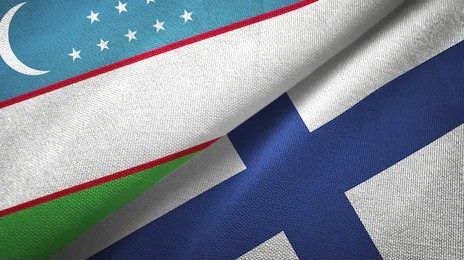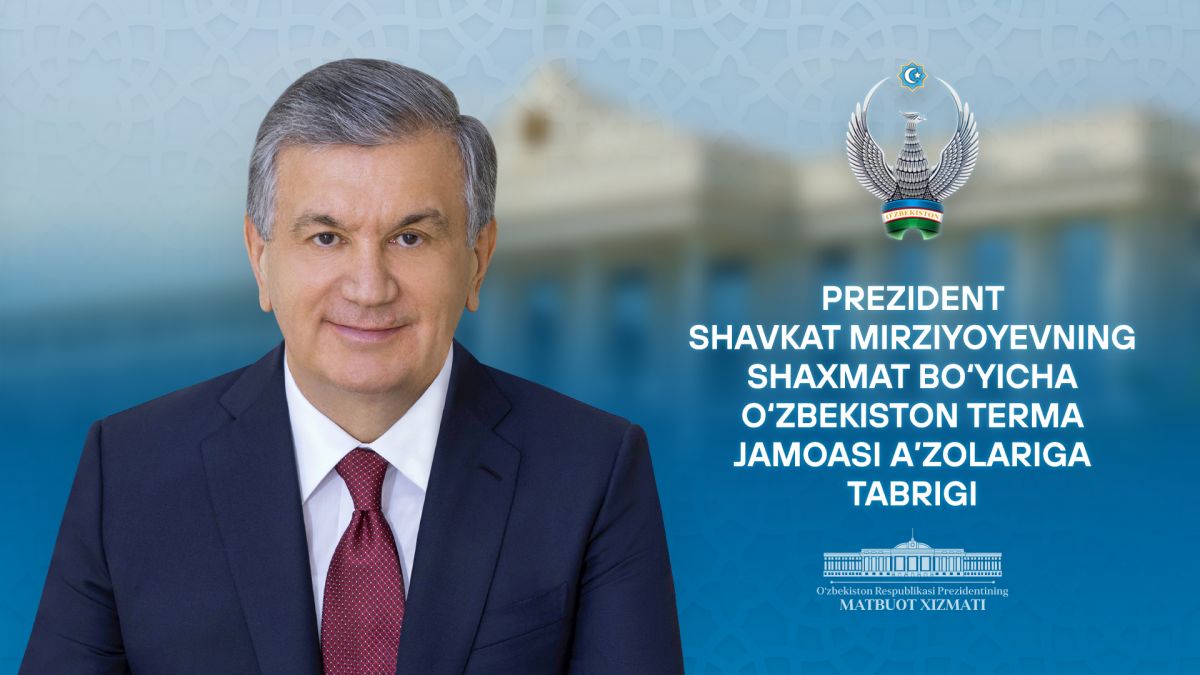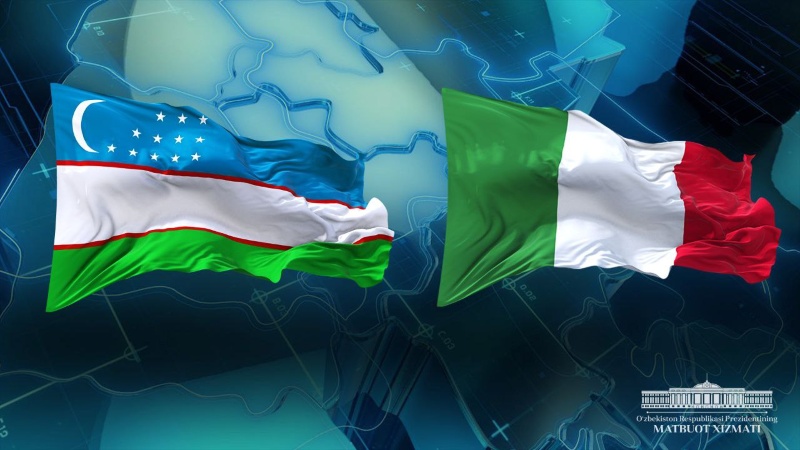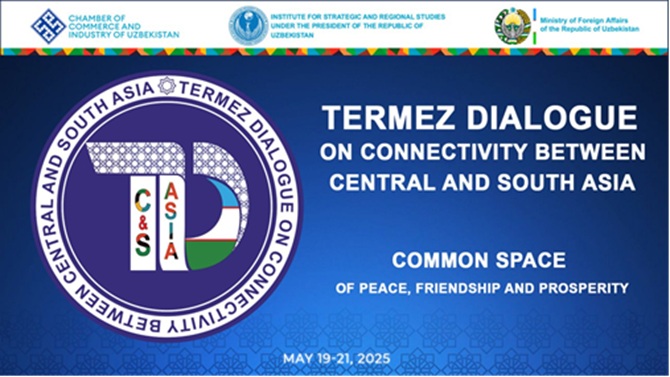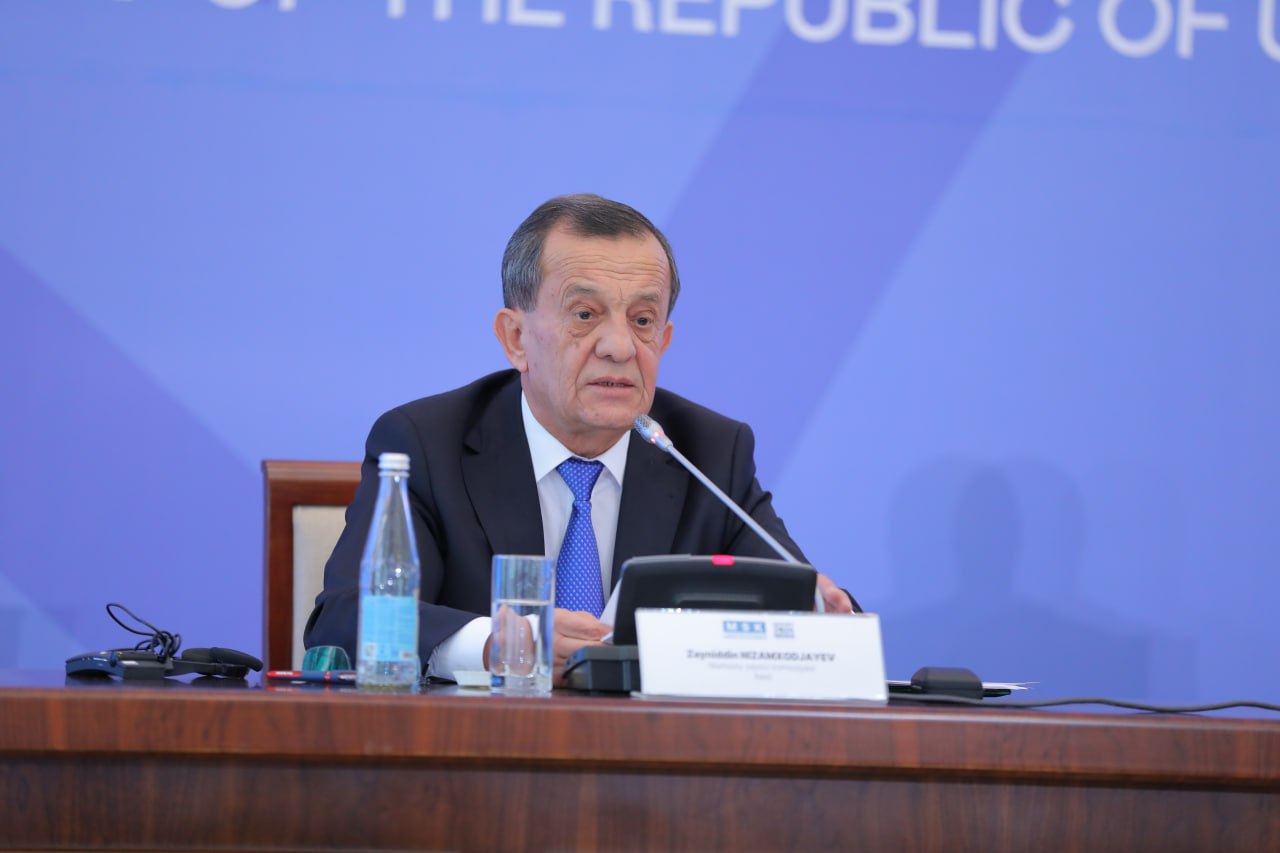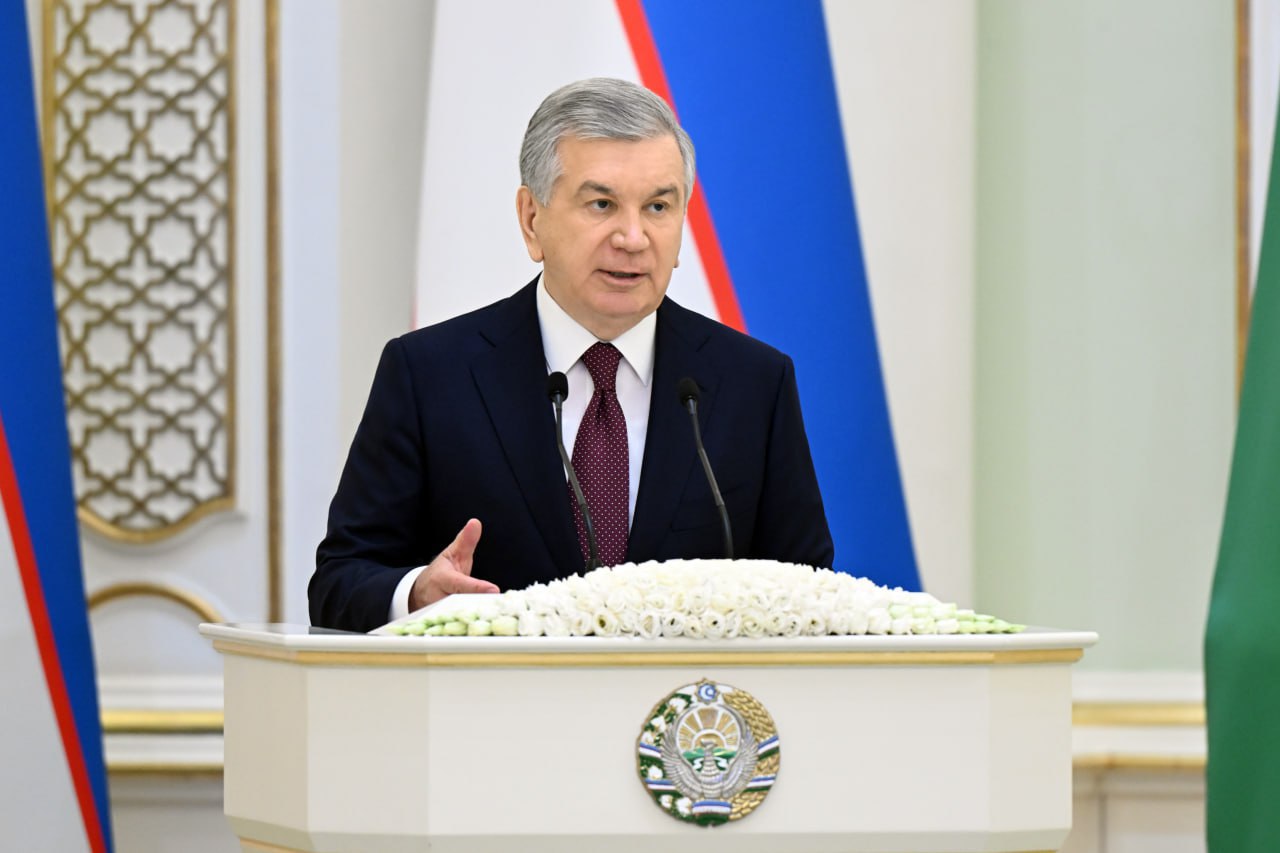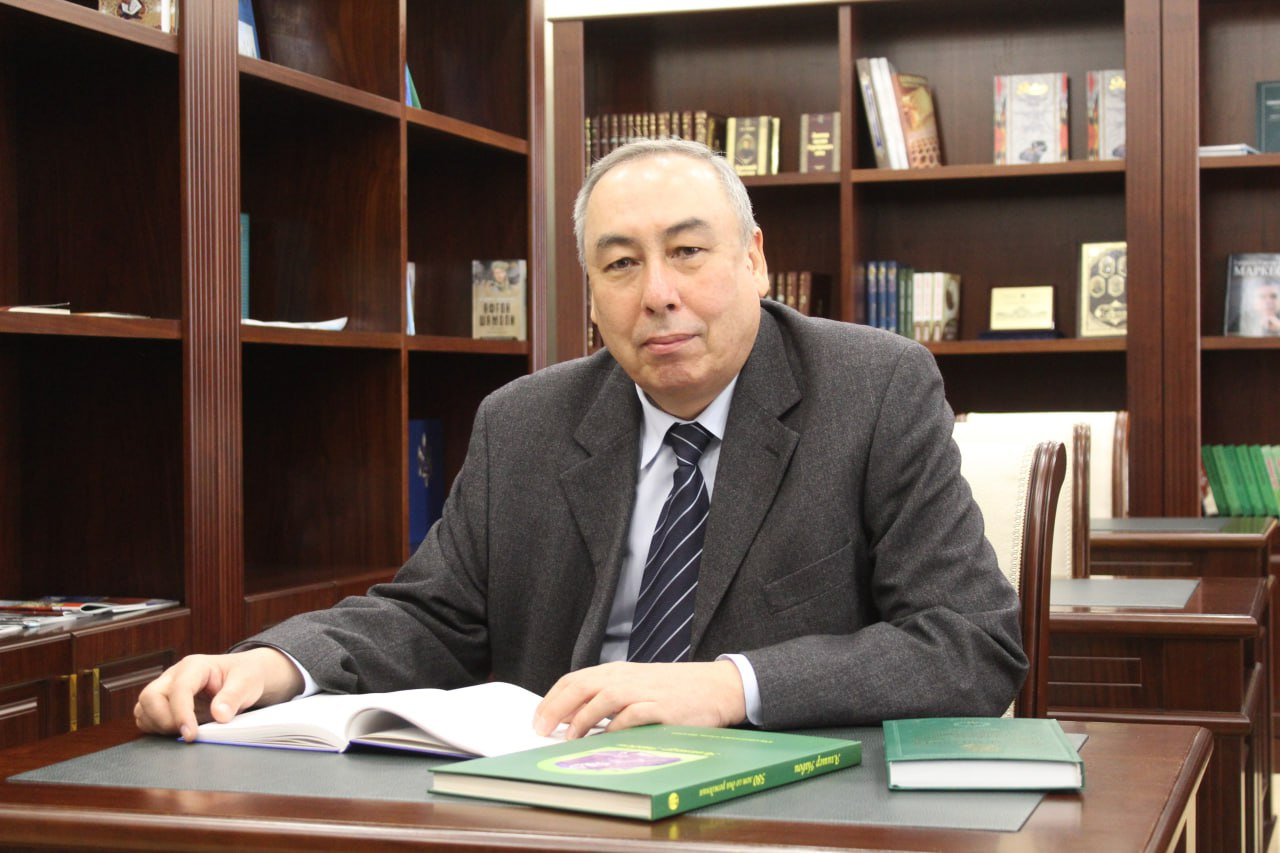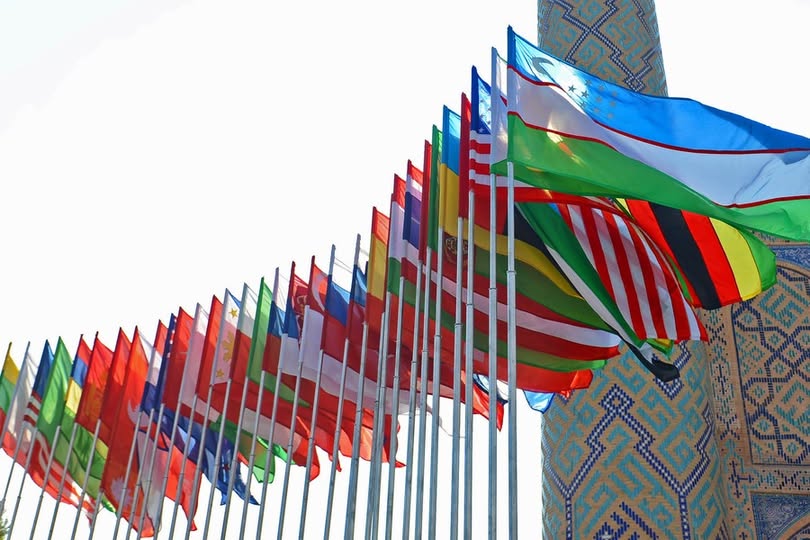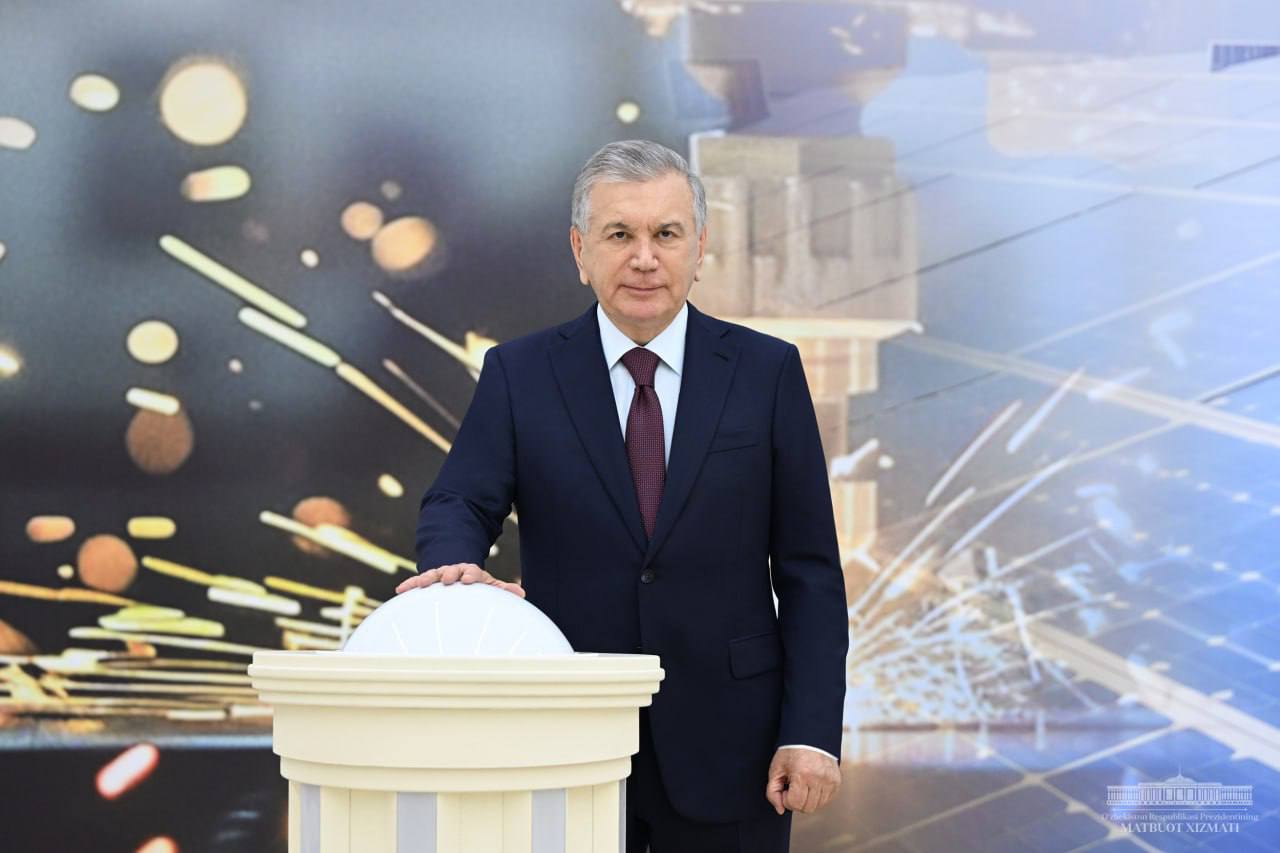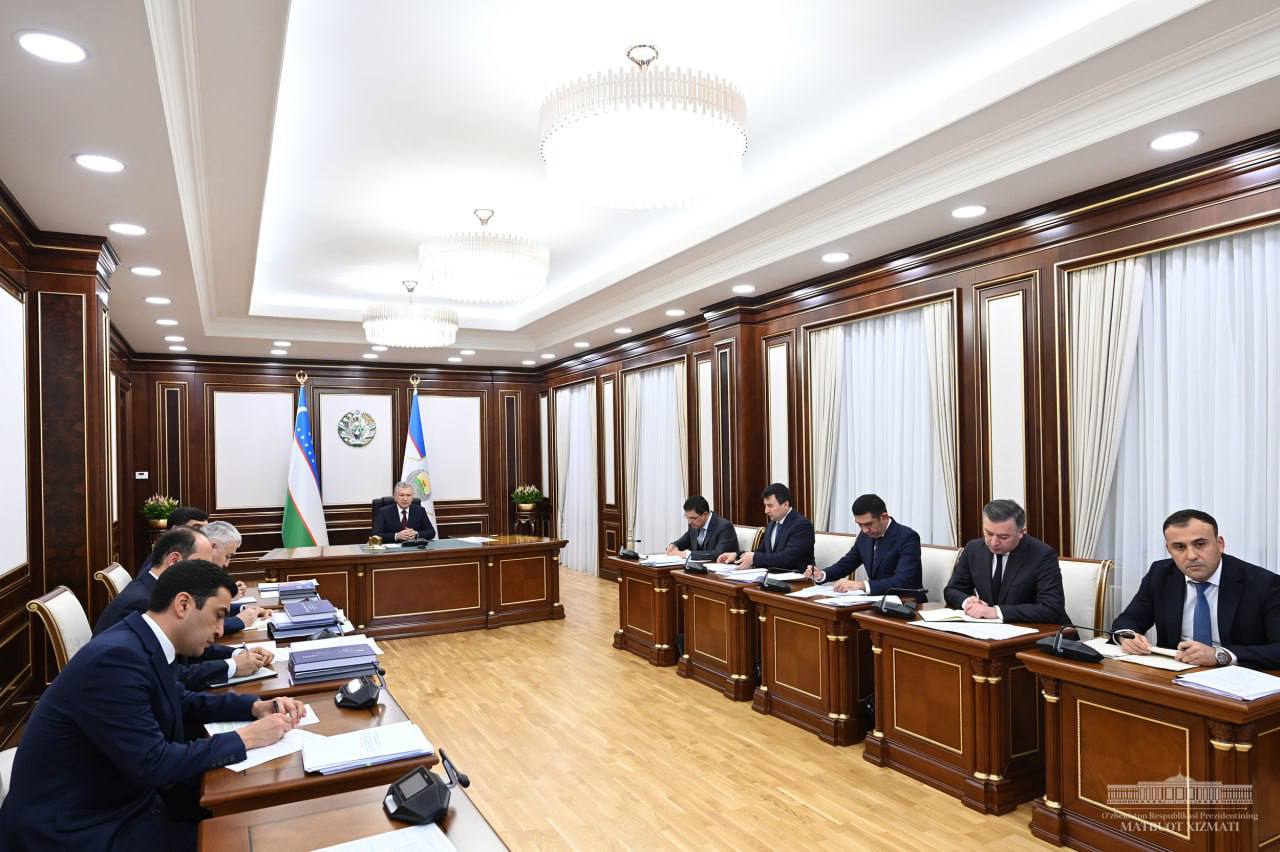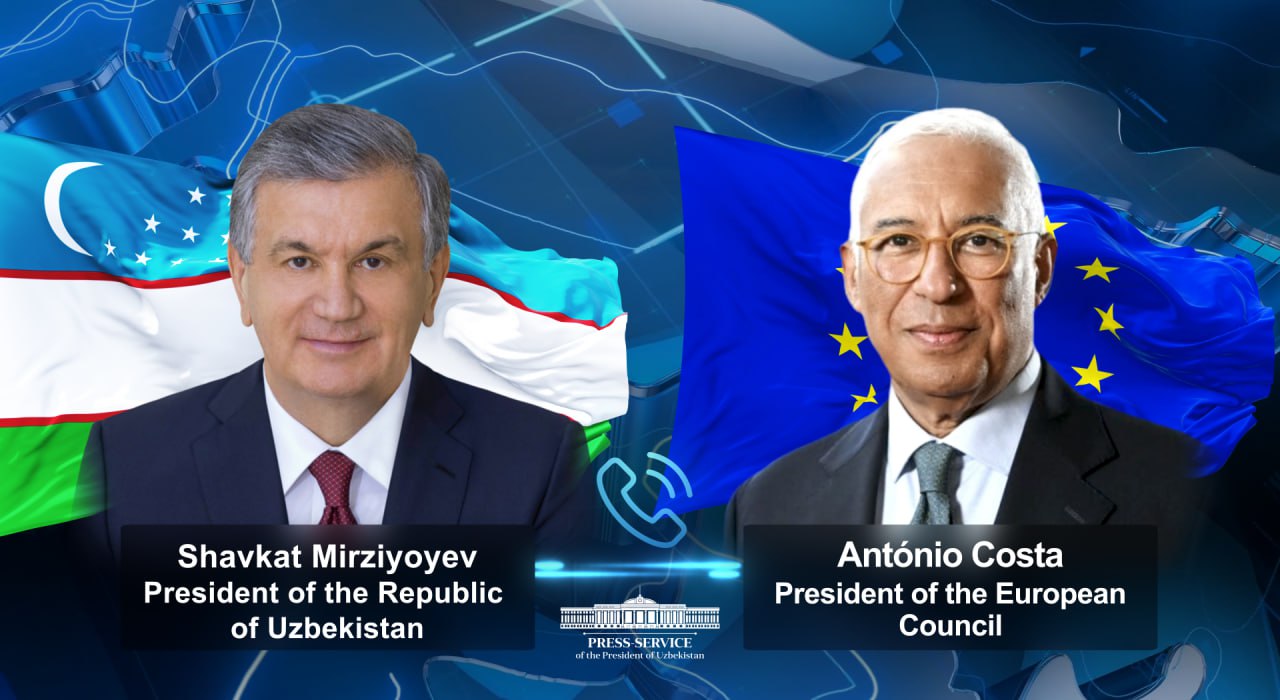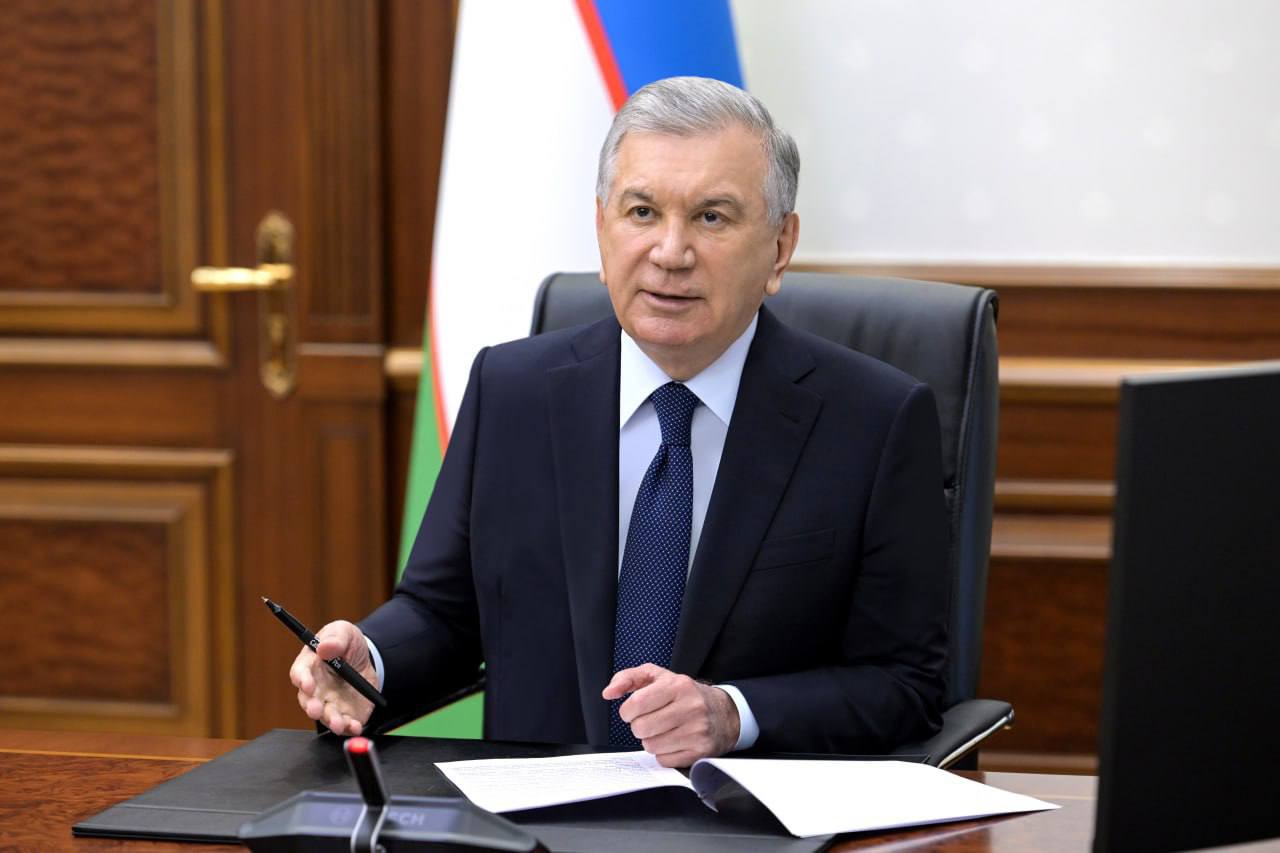Phone
Consular Issues
Phone
Uzbekistan news
We recommend
Uzbekistan and Finland: Digital Groundwater Modeling as a Contribution to Climate Resilience in Central Asia
📅 06.11.2025
Amid growing water scarcity and climate instability in Central Asia, Uzbekistan and Finland are implementing a unique form of scientific cooperation that combines digital innovation with sustainable water resource management.
In 2021, the Ministry of Mining Industry and Geology of the Republic of Uzbekistan and the Geological Survey of Finland (GTK) signed a Memorandum of Understanding aimed at the rational development of natural resources through advanced technologies. Today, this project stands as an example of scientific diplomacy that unites European expertise with Uzbekistan’s potential.
From Paper Maps to Digital Models.
For many years, hydrogeological maps of Uzbekistan existed only in paper form. Within the framework of the joint project, they were digitized using the ArcGIS platform, creating a unified national groundwater database. This digital transformation enables specialists to monitor aquifer conditions, analyze water balances, and forecast the impacts of climate change.
Finnish experts conducted a series of training programs for Uzbek specialists, introducing modern methods of digital mapping and data processing. This strengthened the professional capacity of the sector and laid the foundation for scientifically grounded and transparent water resource management.
Scientific Practice: Experimental Site in Akhangaran.
An experimental site was established in the Akhangaran district of the Tashkent region, where joint research teams conducted geophysical studies and developed digital models of groundwater flow. The obtained data help predict groundwater levels, plan water supply systems, and identify areas vulnerable to drought.
The use of the MODFLOW software package made it possible to create models that provide scientifically based solutions for water resource allocation — particularly important for regions with limited water reserves.
European Partnership for Climate Resilience.
Cooperation with Finland is part of a broader European agenda aimed at supporting climate adaptation and sustainable development in Central Asia. By combining European technologies with Uzbekistan’s scientific resources, the project demonstrates how international partnerships can strengthen ecological security and water stability.
The results of the joint work were published in the journal Water (Scopus) under the title “Assessing Climate Change Impacts on Groundwater Recharge and Storage Using MODFLOW in the Akhangaran River Alluvial Aquifer, Eastern Uzbekistan.”
Furthermore, new areas of cooperation have opened — with the University of Padua (Italy) in geological risk monitoring, and with the Belarusian Scientific and Production Center for Geology in groundwater observation.
Looking Ahead.
The joint project between Uzbekistan and Finland is more than a transfer of technology — it represents a step toward creating a new culture of rational water use and responsible climate action. The establishment of a national digital hydrogeological database will become a key element in the country’s environmentally sustainable development.
As Europe and Central Asia continue to strengthen cooperation in water, energy, and climate, the Uzbek-Finnish project serves as a model of how scientific initiatives can deliver tangible environmental and social benefits.
Members of the Uzbekistan national chess team
📅 24.09.2024
I cordially congratulate you on your worthy participation in the 45th World Chess Olympiad held in Budapest, the capital of Hungary. You have opened another bright page in the history of Uzbek chess, taking the honorable third place among representatives of about 200 countries.
In very sharp and uncompromising chess duels, you, having demonstrated high intellectual potential, unwavering will and steadfastness, outperformed the teams of such countries as China, Serbia, Armenia, Germany, Azerbaijan, Slovenia, Spain, which is truly admirable.
By your example, we have seen that the youth of New Uzbekistan is capable of achieving truly high standards in competitions of mind and thinking, and this has filled our hearts with a sense of joy and pride.
The results achieved by Nodirbek Abdusattorov, Zhavohir Sindorov, Shamsiddin Vokhidov, Nodirbek Yokubboyev and Zhakhongir Vokhidov, who displayed outstanding intellectual abilities, are very valuable and dear to us.
It should be especially noted that Shamsiddin Vokhidov, having won a gold medal and Nodirbek Abdusattorov a silver medal in the board section, proved again what true masters of chess game they are.
Along with courageous and brave young men, our purposeful chess players such as Afruza Hamdamova, Nilufar Yokubboeva, Umida Omonova, Marjona Malikova, Nodira Nodirjonova, who directed all their strength and energy, skill and professionalism to worthily defend the honor of the Motherland, also took part in the competition.
It is undoubtedly noteworthy that they improved their results from the last Olympiad, taking the 12th place among the
170 countries. It is gratifying that our chess player Nodira Nodirjonova won the 2nd place in the board section and was awarded a silver medal. I sincerely congratulate them all, wish them to reach even higher milestones and take prizes at future competitions.
Undoubtedly, the tremendous success of our chess players is a practical result of the enormous attention paid to the youth in New Uzbekistan, the ongoing large-scale reforms to develop sports, including the most intellectual one - chess.
Undoubtedly, such bright achievements further unite our people on the way to noble goals, serve as a source of inspiration for thousands of young men and women.
Taking this opportunity, on behalf of all our people and on my own behalf I express my sincere gratitude to you, my dear ones, to your experienced mentors and coaches who made a great contribution to your success, to all members of the national team, to your parents who supported you and to all chess fans.
May you have good luck in conquering the highest peaks at the next World Chess Olympiad, which will be hosted by our native Uzbekistan for the first time in 2026!
I wish you all health, happiness and well-being, great success in your studies and subsequent activities. May your path to victory be steadfast, my dear ones!
On May 28-29, the Prime Minister of Italy will pay an official visit to Uzbekistan
📅 27.05.2025
The first meeting of the Termez Dialogue on Connectivity between Central and South Asia to take place in Termez from May 19 to 21
📅 16.05.2025
The first meeting of the Termez Dialogue on Connectivity between Central and South Asia, dedicated to the theme "Building a Common Space for Peace, Friendship, and Prosperity," will be held in Termez on May 19-21, 2025. This meeting is expected to be attended by representatives of the foreign policy agencies of Central and South Asian countries, which are becoming the focus of world politics, as well as representatives of specialized UN organizations, international and regional organizations such as the CIS, the SCO, the CICA, and leading specialists and experts in relevant fields.
Central and South Asia have long been connected by reliable trade routes and have served as a bridge between the countries of the Middle East, Europe, and China. The peoples of this region share historical and civilizational commonalities, having repeatedly existed within common state associations in the past, as well as within a single political, economic, and humanitarian space. Over many centuries, relations between the two regions have been strengthened by numerous migration flows, intensive trade exchanges, rapid dissemination of scientific ideas, and cultural cross-pollination.
As a result of the spread of Zoroastrianism, Hinduism, Buddhism, and Islam in these regions, unique ethnocultural associations formed, which left a deep mark on human history.
The incorporation of the peoples of this region into such states as the Bactrian and Kushan kingdoms, the Turkic Khaganate, Khorasan and Transoxiana, the Ghaznavid, Timurid, and Mughal empires had a great influence on their historical, cultural, and political development. Common customs, traditions, lifestyles, and holidays were formed; spiritual values were created in Persian, Turkish, and Arabic. Medieval cities such as Bukhara, Samarkand, Termez, Balkh, Herat, Ghazni, Agra, and Delhi were shared centers of science.
The mutual competition of colonial powers negatively affected the traditional ties, trade, and cultural exchange of the peoples of Central and South Asia. Trade and economic relations in South Asia changed, and local supply systems, main industries, and economies became dependent on supplies from outside the region. This development weakened the traditional cultural ties between South Asia and Central Asia.
Today, jointly addressing existing problems that threaten peace and stability in the region is one of the important factors in the social, cultural, and economic development of these countries. Therefore, the renewal of their close historical ties is becoming increasingly relevant. Taking the above into account, the Termez Dialogue on the Connectivity between Central and South Asia is being organized.
The location chosen for the dialogue is connected to the geostrategic position of this city, situated at the crossroads of Central and South Asia, or at the intersection of interregional connectivity routes. Termez has long been a center of trade, economy, and crafts, serving as a link between the vast regions of Central and South Asia. Therefore, from a geopolitical perspective, the city can be considered a "natural bridge" connecting Central and South Asia, the most suitable place for bringing the peoples of the region closer together through its historical location and cultural heritage.
Currently, the countries of Central and South Asia represent a territory of global significance, with a population of more than 2 billion people and great educational potential. The region is experiencing high demographic growth, with the majority of the population consisting of young people, and there are enormous opportunities for realizing intellectual potential. While the population of South Asian countries is about 2 billion people, the number of people living in Central Asia is about 82 million, and the population of Central Asian states is growing year by year. The countries exhibit a "disparity in literacy levels." For example, among the leading countries of Central Asia, the average adult literacy rate is 99 percent, while in South Asia it is 74 percent.
One of the pressing problems is the uneven quality of education, insufficient coverage of preschool and higher education, especially among girls and residents of remote areas. In South Asia, youth unemployment remains high, and in some countries, this figure exceeds 40 percent. At the same time, the employment rate of women is one of the lowest in the world. In addition, the infrastructure of educational systems is not sufficiently developed, and the shortage of specialists and teacher qualifications also creates a number of problems.
In this context, cooperation in the field of science and education is becoming increasingly relevant. Scientific cooperation in the context of digitalization and geopolitical instability will allow for maintaining dialogue between academic circles. At the same time, limited academic mobility and weak coordination between scientific communities significantly hinder the development of states' potential in science, innovation, and technology.
In this regard, it is necessary to encourage joint research and innovation work, the organization of scientific and educational internships, experience exchange programs, the development of startups, and the holding of competitions.
The adoption of a joint program of academic and research exchanges under the auspices of UNESCO is becoming relevant. It is also necessary to launch an online platform between universities and research structures of the countries of Central and South Asia.
This will contribute to the creation of a sustainable regional network of scientific diplomacy, the formation of a common agenda in the field of education and technology, and the emergence of a unified scientific space.
The above-mentioned steps will serve as a powerful tool for the development of scientific diplomacy, which will facilitate interaction between the countries of the two regions.
From this point of view, the integration of intellectual resources in Central and South Asia, strengthening cooperation in the field of education, and developing cooperation platforms to improve the quality of education are important for the future of the region. The transformation of demographic potential into human capital is the main condition for sustainable development, economic growth, and a worthy place in global competition for both regions. In this regard, the development of education as one of the priority areas of regional cooperation, the development of partnerships for the exchange of experience and training of personnel in various countries is most relevant.
The countries of the region, in particular India and other South Asian countries, have in recent decades been occupying an increasingly prominent place in the world community in the field of science, technology, and innovation. Information technology, aeronautics, pharmaceutical production, and artificial intelligence are rapidly developing in India. For example, in 2014, the Indian Space Research Organisation (ISRO) made history as the first Asian country to launch an artificial satellite into Mars orbit. In 2023, as part of the "Chandrayaan-3" project, a successful landing on the Moon's surface was achieved. These results demonstrate the country's independent and innovative capabilities in the scientific field.
In the field of information technology, India has become one of the world's largest IT outsourcing centers. Cities such as Bangalore, Hyderabad, Pune, and Chennai have become major hubs for Google, Microsoft, Amazon, IBM, Oracle, and many other multinational corporations. Every year, millions of specialists in technical and technological fields are trained in the country. Among India's higher education institutions are prestigious scientific centers like the Indian Institutes of Technology (IITs) and Indian Institutes of Science (IISc), which also rank highly in global ratings. It's worth noting that scientific research in artificial intelligence, bioengineering, quantum computing, and cybersecurity is widespread in the country.
Pakistan is also making progress in science, especially in nuclear energy and military technologies. Centers such as COMSATS University and the Pakistan Institute of Engineering and Applied Sciences (PIEAS) play a crucial role in the country's scientific development. In particular, government programs are being implemented to strengthen international cooperation in IT and cybersecurity.
In Bangladesh, alongside the textile and light industry, information technology is developing rapidly. Based on the "Digital Bangladesh" strategy, the country has widely implemented e-government, digital, and distance learning services. In 2021, over 120 IT parks were established in Bangladesh, demonstrating the country's commitment to digitalizing its economy.
Afghanistan's scientific and technological potential remains limited, and issues related to political stability are hindering its development. Nevertheless, some universities and educational institutions in the country, particularly Kabul University, participate in scientific projects with the support of various international educational organizations.
In this context, developing a joint strategy for digital connectivity between Central and South Asia is crucial. Adopting such a document will create significant opportunities for stimulating trade and investment, improving access to education and healthcare, strengthening regional cooperation, and increasing competitiveness on the global stage.
Coordinating efforts of Central and South Asian countries to widely implement the digital economy will contribute to improving digitalization processes in all spheres of life. Moreover, this will advance the implementation of the SDG initiative to ensure safe Internet access for the population and will open up great opportunities for education and medical services.
Overall, deepening digital connectivity between Central and South Asia will bring significant economic and social benefits to both regions, create a solid foundation for expanding trade, economic, energy, and transport links, and enhance the competitiveness of the region's states on the global arena.
In general, the Termez Dialogue is an important initiative that contributes to elevating the interaction between Central and South Asian states to a new level in the process of today's geopolitical and civilizational transformations. This dialogue, particularly in the fields of education, science, and new technologies, will stimulate, consolidate, and expand the intellectual potential of the two regions. This is because in both regions, the majority of the population consists of young people who show high interest in education, are capable of scientific research, and quickly adapt to digital technologies.
Today, countries such as India, Pakistan, and Bangladesh have achieved world-class successes in information technology, biotechnology, nuclear physics, medicine, and artificial intelligence, while Uzbekistan, Kazakhstan, and other Central Asian countries are also taking active measures to update scientific infrastructure, expand international cooperation, and implement modern educational projects. The Termez Dialogue is a unique opportunity to combine this experience and achievements, establish student and scholar exchanges, create joint research centers, and develop startups and innovative platforms in IT and STEM.
This dialogue has great historical significance in ensuring regional stability, creating a foundation for peace, progress, and intellectual development through science and education. The states of Central and South Asia have the potential to become the leading intellectual center in the entire Eurasian space based on the principle of mutual trust and shared future, integration in the spheres of education and science.
Preliminary results of parliamentary elections in Uzbekistan announced
📅 28.10.2024The text of the article is in Uzbek!
President of Uzbekistan: The time has come for a new generation of diplomats – those who achieve concrete results and firmly defend the interests of Uzbekistan in the international arena
📅 22.01.2026
The Head of State identified priorities for updating the activities of the Ministry of Foreign Affairs and foreign diplomatic missions
On January 15, an expanded meeting was chaired by President Shavkat Mirziyoyev on the activities of the Ministry of Foreign Affairs and diplomatic missions abroad, reports Dunyo IA correspondent.
Opening the session, the Head of our state noted that the meeting is taking place amid sharp geopolitical changes in the world and increasing threats to the sovereignty of states. In this regard, the need to critically assess current foreign policy activities and move to a renewed format for organizing the work of the Ministry of Foreign Affairs and foreign diplomatic missions was emphasized.
President noted that 2025 had been a productive year for the country's foreign policy. During the year, high-level visits were made to 26 foreign countries, and for the first time in recent history, visits to Uzbekistan were organized by the leaders of a number of countries. Multilateral dialogues in the “Central Asia Plus” format became productive. In recent years, strategic partnerships have been established with 11 countries, bringing the total number to 19, and allied relations have been built with Kazakhstan, Azerbaijan, and Tajikistan.
– As a result of an open, pragmatic, thoughtful and proactive foreign policy, Uzbekistan is consistently strengthening its position as one of the global centres of peace and diplomacy, – emphasized President.
Since 2017, 16 new diplomatic missions and consulates have been opened abroad, bringing their total number to 60, and the number of countries with which diplomatic relations have been established to 165. There has also been an increase in the number of staff and salaries of employees of embassies, consular offices, representative offices to international organizations and employees of the Ministry of Foreign Affairs.
At the same time, a fundamental question was raised as to whether all diplomatic missions are making full use of the opportunities provided.
– In the current environment, an ambassador is not just a person who conducts political dialogue. An ambassador is a state representative who attracts investment and technologies, opens new export markets, launches transport and logistics corridors, increases tourist flows, creates conditions for legal labor migration and, most importantly, protects the rights of our citizens, - emphasized President.
In this regard, it was noted that key performance indicators for ambassadors should include the volume of export revenues from the countries of residence, growth in tourist flows and the effectiveness of organizing legal labor migration.
Particular emphasis was placed on the need to increase exports and investments by strengthening economic diplomacy.
As part of bilateral and multilateral events in 2025, agreements were signed on investment projects and trade contracts totaling $160 billion. For the first time in history, foreign trade turnover exceeded $80 billion, exports reached $33,5 billion, and foreign investment exceeded $43 billion. Exports to 75 countries increased by almost $4,5 billion.
In view of this, the ambassadors have been tasked with expanding export deliveries to the Middle East, Europe, Asia, and Africa, as well as implementing specific projects in the fields of industry, agriculture, the chemical industry, the textile industry, greenhouse farming, and the service sector. At the same time, it was noted that Uzbekistan's products remain insufficiently recognized in certain markets.
It was noted that the growth of logistics costs has a negative impact on the competitiveness of domestic products. In this regard, the need to diversify transit routes, optimize logistics chains, and develop additional proposals to reduce transportation costs when entering European markets was indicated.
In the agricultural sector, tasks have been set for researching and implementing water-saving technologies, modern agricultural technologies, and innovative greenhouse solutions. Along with this, measures have been outlined to expand export markets for chemical industry products, bring domestic manufacturers up to international standards and requirements, and organize specialized exhibitions and presentations.
The need to intensify trade and economic cooperation with the African continent as one of the promising new export destinations has been emphasized. To this end, a clear roadmap is to be developed with the participation of relevant ministries and foreign diplomatic missions.
It was noted that ambassadors should be directly interested in finding promising projects, attracting them, and implementing them in practice. In this regard, it was decided to introduce financial incentives for ambassadors who bring specific investment or export projects to a logical conclusion.
Criticism was levelled at the insufficient realisation of existing potential in a number of areas. In particular, it was noted that opportunities to attract international grants are not being fully exploited. It was noted that with closer and more systematic interaction between ministries, industry leaders, and ambassadors, it would have been possible to attract an additional $200-300 million in grant funds last year.
As noted, international organizations and donor countries announce grant programs worth approximately $200 billion annually. In this regard, the task has been set to implement a unified, systematic and effective approach to working with grants.
In addition, the need to take concrete measures, together with the ambassadors to the United States, the United Kingdom, Germany, Switzerland, China, Japan and Singapore, to attract leading foreign universities ranked in the top 100 worldwide as partners of Uzbek higher education institutions was emphasized.
It was noted that cooperation between regions and diplomatic missions in expanding foreign economic relations is still insufficient. The need for active participation of regional governors, together with ambassadors, in the systematic promotion of export-oriented products of the regions and in facilitating the entry of local enterprises into foreign markets was emphasized.
Providing Uzbek citizens with legal and high-paying jobs abroad was identified as another priority area. The expansion of the geography of organized labor migration was noted, while it was pointed out that in a number of countries, work in this area is not sufficiently effective and relevant instructions were given in this regard.
It was emphasized that embassies and consulates should actively protect the rights and legitimate interests of citizens and provide qualified legal assistance in each specific case. The task has been set to abandon "office diplomacy", strengthen work in the field and establish direct dialogue with compatriots.
In the field of tourism, the need to further strengthen the role of ambassadors, introduce new approaches to promoting the country's tourism and cultural potential, make effective use of visa-free regimes and attract international outsourcing companies has been identified.
Issues related to expanding foreign policy ties, high-quality and timely preparation of high-level visits, retraining of diplomatic personnel, and the formation of a reserve of promising specialists were also discussed.
The intensification of foreign information policy and the improvement of the country's international image through systematic work with foreign media and the implementation of special media projects were identified as priority tasks.
The need to update the Concept of foreign policy of the Republic of Uzbekistan, review its priority areas, and define clear tasks for protecting national interests and strengthening the country's position in the international arena was emphasized.
As the President noted, the new concept should comprehensively reflect long-term strategic goals, the logic of internal reforms as well as national interests in the areas of economic diplomacy, security, investment, exports, transport and logistics, water and climate issues.
In order to give proper recognition to the achievements of diplomats, it was proposed to establish the honorary title of “Honored Diplomat of the Republic of Uzbekistan".
At the end of the meeting, President Shavkat Mirziyoyev emphasized: “The time has come for a new generation of diplomats – those who achieve concrete results and firmly defend the interests of Uzbekistan in the international arena”.
In the course of the session, reports and proposals of our ambassadors abroad were heard.
Dunyo IA
The Fergana Valley — A Space of Shared Values and Cultural Convergence
📅 17.10.2025
On October 15–16, 2025, the city of Fergana will host the inaugural session of the Fergana Peace Forum under the theme: “The Fergana Valley: Uniting Efforts for Peace and Progress.”
Organized by the Institute for Strategic and Regional Studies (ISRS) under the President of the Republic of Uzbekistan, in partnership with colleagues from Kyrgyzstan and Tajikistan, and supported by national and international organizations, this unique large-scale event will bring together leading experts, researchers, public figures, and representatives of international organizations. Their goal is to discuss the prospects for the development of one of Central Asia’s most densely populated and culturally rich regions — the Fergana Valley.
Experts from prominent think tanks across the CIS, Asia, Europe, and the Americas, alongside academics, business leaders, civil society representatives, and youth leaders from the region, will convene in one place. High-level delegates from international bodies such as the United Nations, the Shanghai Cooperation Organization (SCO), the Commonwealth of Independent States (CIS), the Conference on Interaction and Confidence-Building Measures in Asia (CICA), the European Union, and the Organization for Security and Co-operation in Europe (OSCE) are also expected to participate. Renowned peacebuilding organizations including the Berghof Foundation (Germany), the Martti Ahtisaari Peace Foundation (Finland), PeaceNexus (Switzerland), and the Stockholm International Peace Research Institute (SIPRI) will be among the invited guests.
More than 300 participants will attend the Forum, including around 150 from Central Asia and over 50 from the CIS, Asia, Europe, and the Americas.
Experts believe the Forum will reinforce the vision expressed by Uzbekistan’s President Shavkat Mirziyoyev at the 80th session of the UN General Assembly — the transformation of Central Asia into a space of peace, good neighborliness, and partnership.
As President Mirziyoyev has noted, the region is entering the era of New Central Asia. The days of closed borders, unresolved disputes, and conflicts are becoming a thing of the past. Thanks to growing cohesion, stability, and an emerging shared identity, Central Asia is increasingly recognized as an independent and influential actor on the global stage.
The choice of the Fergana Valley as the Forum’s venue is symbolic. This unique region is where the lifelines of Uzbekistan, Kyrgyzstan, and Tajikistan intersect. The established atmosphere of trust, dialogue, and cooperation between these countries exemplifies the good-neighborly policy championed by President Mirziyoyev.
Historical records mention the ancient Fergana state of Davan, especially the cities of Aksikent and Mingtepa, which were famed for their fertile lands, strong defenses, and prized horses. These are documented in Chinese chronicles from the late 2nd century BCE. By medieval times, the valley was one of the leading regions of Mawarannahr (Transoxiana). Archaeological remains from the Bronze Age, Early Iron Age, and medieval periods testify to the valley’s role as a cradle of multiple civilizations.
The Han dynasty historian Sima Qian wrote: “The people live on the land, tilling fields and growing rice and wheat. They live in houses and fortified cities; there are about seventy or more cities of various sizes in this region.” Medieval Arab geographers described Fergana as a land dotted with many cities and villages, surrounded by steppes and mountains, where both urban life and pastoralism thrived.
Cities such as Kokand, Khujand, Osh, and Margilan were centuries-old centers of craftsmanship, trade, and learning. Caravans of the Great Silk Road passed through here; some of the earliest madrasahs were established in the valley. The region became a crossroads for ideas from Persia, China, India, and the Arab world.
Situated at the intersection of Hellenistic, Bactrian, Parthian, Chinese, and Islamic civilizations, the Fergana Valley is a unique hub of cultural exchange — a legacy evident today in its languages, traditions, cuisine, and architecture.
Experts agree that the peoples of the Fergana Valley form a unified historical and civilizational community — a reality forged over centuries of political, economic, and humanitarian interaction.
The Fergana Valley is living proof that the coexistence of diverse cultures is not only possible but also fruitful. Here, traditions are preserved while new forms of cooperation continuously emerge, from joint celebrations to cross-border initiatives. The region has effectively become a laboratory for cultural convergence, where the ideals of inter-civilizational dialogue are actively realized.
With its rich heritage, dense population, and vast economic potential, the Fergana Valley requires special attention to sustainable development, environmental security, and cross-border cooperation.
Coordinated action and open dialogue are essential here — to foster peace, mutual trust, and progress. The Forum’s agenda addresses a wide range of issues:
- Strengthening regional dialogue and trust;
- Jointly ensuring stability and sustainable development;
- Unlocking the valley’s economic and investment potential;
- Promoting cultural and humanitarian ties;
- Increasing the involvement of civil society, youth, and the private sector in transformation processes.
Special focus will be placed on turning challenges into opportunities and establishing regional cooperation as a firm foundation for peace and prosperity.
The maturity of the Fergana Valley is reflected in its shared historical and cultural foundation, which allows the countries in the region to build dialogue on existing trust rather than starting from zero.
Today, the Fergana Valley is more than a historical symbol — it is a strategic region for sustainable development and economic cooperation. Joint transport and energy projects, cross-border markets, and digital initiatives are driving dynamic growth.
The Fergana Peace Forum is poised to become not just a discussion platform but an ongoing mechanism for generating ideas, uniting efforts, and advancing projects for the benefit of the entire region.
Organizers highlight that the example of the Fergana Valley could serve as a model for post-conflict regions worldwide, where political stabilization must be accompanied by deep cultural and humanitarian work. Real mechanisms of cooperation are being forged here, grounded in a shared historical and cultural legacy that supports peace and development.
Among the anticipated outcomes of the Forum is the adoption of a Communiqué calling for the establishment of a unified space of friendship, good neighborliness, and sustainable development in the Fergana Valley.
Preparatory discussions have already confirmed that the Fergana Valley is a place where the past inspires, the present unites, and the future is built on values of peace and cooperation.
In a world where conflict has become commonplace and the international community searches for new models of sustainable coexistence, the Fergana Peace Forum offers one clear answer: peace begins with trust, and trust begins with open dialogue.
Fergana is not just a point on the map — it is a space where respect becomes the language of communication, friendship forms the foundation of neighborliness, and cultural diversity is a source of unity.
Dr. Alisher Sabirov, Doctor of Historical Sciences,
Professor, Nizami National Pedagogical University, Uzbekistan;
Adjunct Associate Professor, Shaanxi Normal University, People’s Republic of China
Active Diplomacy of Uzbekistan: 2025 — From Dynamic Dialogue to Tangible Results
📅 28.12.2025
The year 2025 marked a stage of qualitative renewal and consolidation of Uzbekistan’s foreign policy positions. Amid a complex and ambiguous international environment characterized by rising geopolitical tensions, the transformation of global institutions, and intensifying competition for resources and markets, Uzbekistan, under the leadership of President Shavkat Mirziyoyev, consistently pursued an open, pragmatic, active, and proactive foreign policy. This approach not only helped preserve the stability of external relations but also infused them with new substantive content aligned with the country’s long-term interests and domestic development priorities.
As emphasized by the President of Uzbekistan, Shavkat Mirziyoyev, in his Address to the Oliy Majlis and the people on December 26, 2025, “in recent times the country has been becoming an international platform for dialogue where global issues are discussed.”
As an integral part of the large-scale socio-economic reforms underway in the country, the diplomatic strategy of New Uzbekistan was aimed at creating favorable external conditions for economic modernization, attracting foreign investment and tourists, expanding export potential, and strengthening humanitarian and cultural ties. The foundations of this foreign policy course remained the principles of openness, equal partnership, mutual respect, non-interference in the internal affairs of states, and strict adherence to international law.
Political dialogue at the highest level with prominent world leaders has reached a new stage and become regular. New agreements have been reached with the leaders of the United States, China, Russia, France, Italy, Turkey, South Korea, Japan, Malaysia and a number of Arab states. In 2025, the number of bilateral meetings at the level of heads of state and government exceeded 55, which indicates a growth in mutual trust with foreign partners.
A similar trend was observed in the development of intensive high-level political dialogue. Throughout the year, high-level Uzbek delegations carried out 172 visits to 93 countries, covering virtually all key regions of the world. Representatives of ministries, agencies, and regional administrations also played a substantial role in shaping the international agenda. With the support of diplomatic missions, they undertook around 300 official visits to more than 50 countries, bringing foreign relations to a more practical and results-oriented level.
Acting as an active host, Uzbekistan has become one of the centers of world diplomacy. This is clearly demonstrated by the fact that the country has hosted forums, assemblies and conferences of the Inter-Parliamentary Union, the United Nations Civil Service, the UNESCO General Conference, the International Climate Conference, the Tashkent Summit of the countries of the region and a number of other major events. Our country has hosted over 120 high-level foreign delegations, as well as about 300 delegations from regional authorities of foreign states. These contacts have contributed to the development of interregional cooperation, the establishment of direct links between business circles and the expansion of the legal framework for cooperation.
Central Asia traditionally occupies a special place in Uzbekistan’s foreign policy strategy. In 2025, this priority received further institutional development. Uzbekistan chaired the Consultative Meeting of the Heads of State of Central Asia, with the chairmanship implemented for the first time on the basis of a comprehensive standalone program. Its agenda covered economic cooperation, transport connectivity, environmental issues, rational use of water resources, and humanitarian exchanges.
The organization of more than twenty major events and the holding in Tashkent of a summit of Central Asian leaders—historic in its outcomes and chaired by President Shavkat Mirziyoyev—became the culmination of regional diplomacy for the year. These developments confirmed the region’s aspiration to deepen mutual trust and pursue joint development.
Today, we can say with confidence that our vast region is becoming a unified, fully-fledged player in world politics for the first time in a long time. This is evidenced by the growing attention of the international community and the changed perception of the region on the global stage. A striking example is the development of the ‘Central Asia Plus’ formats, which in 2025 were filled with new concrete practical content. The summits with the European Union, China, Russia, the United States and Japan clearly demonstrated the region's increased role in global politics and strengthened its position as an area of stability, predictability and mutually beneficial cooperation.
An important direction of Uzbekistan’s foreign policy in 2025 was the further expansion of its geographical reach. Alongside traditional partners in the CIS, Europe, and Asia, contacts with countries in Eastern Europe, the Middle East, Africa, and South America were intensified. The first-ever bilateral high-level engagements with Slovakia, Serbia, Jordan, Paraguay, and several other states testified to the consistent expansion of Uzbekistan’s international presence. As a result, the total number of countries with which Uzbekistan maintains diplomatic relations reached 165.
Against this backdrop, several events of strategic significance had a profound impact on Uzbekistan’s foreign policy positioning in 2025. The signing of the Enhanced Partnership and Cooperation Agreement with the European Union and President Shavkat Mirziyoyev’s visit to Brussels marked a transition in relations with the EU to a qualitatively new level. The agreement established a solid legal framework for deepening political dialogue, expanding trade and economic ties, attracting investment, and developing cooperation in sustainable development, the green economy, and digitalization, while also reflecting the high assessment by European partners of Uzbekistan’s ongoing reforms.
Continuing its course toward expanding and deepening engagement with key global centers of power, Uzbekistan steadily developed relations with the United States. A landmark event in this regard was the successful outcome of the “C5+1” summit held in Washington in November, which brought together the leaders of the United States and the Central Asian states. Uzbekistan’s role in this format has been widely recognized by international experts and policymakers as that of a key initiator of regional cooperation and a responsible partner of the United States in the areas of sustainable development, security, economic interaction, and humanitarian ties.
Equally significant was the participation of the President of Uzbekistan in the session of the United Nations General Assembly. The head of state’s address from the UN’s main international platform reaffirmed the country’s commitment to multilateralism, peaceful dialogue, and the collective search for solutions to pressing global challenges.
In 2025, four resolutions initiated by Uzbekistan were adopted by the UN General Assembly, reflecting the country’s priorities in sustainable development, regional security, and humanitarian cooperation. In addition, Uzbekistan was elected to several authoritative UN bodies, underscoring the growing trust of the international community.
A historic event of the year was the holding of the 43rd session of the UNESCO General Conference in Samarkand. For the first time in forty years, this forum took place outside Paris, representing unprecedented recognition of Uzbekistan’s cultural, historical, and civilization significance. For several days, Samarkand became a global platform for dialogue on education, science, and culture, strengthening the humanitarian dimension of Uzbekistan’s foreign policy and its image as a center of intercivilizational interaction.
Alongside active political diplomacy, economic diplomacy developed dynamically in 2025, firmly establishing itself as one of the key instruments of the country’s foreign policy. Systematic work within the framework of “Ministry of Foreign Affairs — diplomatic missions — sectoral agencies — regions” yielded tangible results in attracting foreign investment and expanding external economic ties. Over the first ten months of the year, USD 34.4 billion in foreign investment was mobilized with the support of diplomatic missions.
The effectiveness of Uzbekistan’s economic policy received high praise from international financial institutions and rating agencies. In 2025, Fitch Ratings and S&P upgraded the country’s sovereign credit rating from “BB-” to “BB,” while Moody’s revised its outlook from “stable” to “positive,” reflecting growing confidence in the economy and the sustainability of ongoing reforms.
The intensification of foreign economic activity also contributed to the growth of trade indicators. Over the first eleven months of 2025, Uzbekistan’s foreign trade turnover reached USD 72.7 billion, with exports amounting to USD 30.8 billion—an increase of USD 6.6 billion compared to the same period of the previous year. A significant reduction in the trade deficit was the result of targeted efforts by diplomatic missions to diversify markets and promote domestic products abroad.
Tourism, as an element of “soft power,” played an important role in shaping Uzbekistan’s positive international image in 2025. Over eleven months, the country was visited by 10.7 million foreign tourists, with more than one million foreign visitors welcomed each month on average. Active participation in international exhibitions, large-scale promotional events abroad, and the hosting in Tashkent of the first “Central Asia–European Union” Tourism Forum helped strengthen Uzbekistan’s position as one of the most promising tourist destinations in the region.
Considerable attention was also devoted to protecting the rights and interests of Uzbek citizens abroad, an important humanitarian dimension of foreign policy. From January to September 2025, more than 385,000 consular actions were carried out, including the return of unlawfully confiscated documents and the recovery of unpaid wages, alongside the implementation of programs facilitating the return of compatriots to their homeland. In parallel, digital consular services were improved, the geography of visa-free and simplified entry for Uzbek citizens was expanded, and cooperation with diaspora communities was strengthened.
In summary, the outcomes of 2025 clearly demonstrate that Uzbekistan’s foreign policy has reached a high level of maturity, consistency, and effectiveness. The country not only strengthened its positions on the international stage but also successfully leveraged diplomatic instruments to support domestic development, enhance investment attractiveness, and improve the quality of life of its citizens. Uzbekistan concludes the year with an expanded network of partnerships, a robust legal and contractual framework, and a clear vision for the future—remaining open to the world and looking ahead with confidence and optimism.
Dunyo IA
9 projects with a total value of 2 billion dollars
📅 15.10.2024The text of the article is in Uzbek!
Investments’ implementation, poverty and unemployment reduction set as priority tasks in Bukhara
📅 02.12.2024
On November 29, President Shavkat Mirziyoyev convened a meeting dedicated to identifying additional opportunities, increasing investments and jobs in Bukhara region.
Previously, the economy of this region was mainly linked to agriculture. However, over the past seven years, the region has attracted more than $4 billion investments, enabling development of such industries as energy, electrical engineering, chemicals, pharmaceuticals, textiles and leather. In the past period of the current year, 1.5 million foreign tourists visited Bukhara.
The visit of the Head of State to the region on May 31-June 1 gave a new impetus to its development. All the tasks outlined during the visit will be fully accomplished by the end of the year.
At the same time, it is important to ensure further growth of economic indicators in 2025, increase employment and well-being of the population. To this end, the working group studied additional opportunities of the region and factors hindering entrepreneurship development.
The critical meeting emphasized that the region's economic performance does not correspond to its potential. Work on investment absorption, poverty and unemployment reduction was recognized as unsatisfactory.
In this regard, the hokims, their deputies and sector heads will be put on emergency duty for a period of six months. The entire focus will be on improving these three areas. Special attention will be paid to implementing 70 driver projects based on the experience of Saikhunobad, Uychi, Zarbdar and Gijduvan. They will provide income to 150 thousand people and lift 40 thousand people out of poverty.
As it was mentioned, each district of the region can be specialized for a certain industry. For example, Peshku and Shafirkan - for production of construction materials and textiles, Kagan city, Alat and Jondor districts - for food industry, Gijduvan and Romitan - for chemical industry. This will make it possible to implement projects of entrepreneurs worth $150 million, create 411 small enterprises and provide 12 thousand jobs.
Four textile factories are planned to be built in Vabkent, Karakul, Jondor and Alat at a total cost of $320 million. This will double the volume of finished knitwear and textile products and create 5,000 jobs.
Next year, the number of foreign tourists is expected to reach 2.2 million and tourism exports are expected to reach $600 million. This will be supported by opening 69 new hotels and 2 thousand handicraft stores.
It is planned to develop additional 20 thousand hectares of land, which will allow to grow additional 100 thousand tons of agricultural products and provide employment for 2 thousand people. Trees and food crops will be planted on vacant homestead land, along canals and field edges.
Another opportunity is pastures. In Bukhara region their area exceeds 2 million hectares. As part of the decisions made at a recent meeting on horticultural development, it is planned to grow pistachios on unused pastures.
Hokim of Bukhara region presented plans to utilize these opportunities. In general, next year 106 projects will be implemented, 105 thousand permanent jobs will be created, exports will be increased by $350 million due to foreign investments worth $2 billion.
The Head of State pointed out the insufficiency of these plans and instructed to intensify efforts and improve results. He tasked to revise the proposals again and draft a relevant resolution.
President of Uzbekistan discusses with the head of the European Council the issues of further expansion of multifaceted cooperation
📅 27.01.2025
During a telephone conversation between President of the Republic of Uzbekistan Shavkat Mirziyoyev and President of the European Council António Costa on January 23, topical issues on the bilateral and regional agenda were discussed.
The President of Uzbekistan sincerely congratulated António Costa on his election as the head of the European Council and wished him great success.
It was noted with deep satisfaction that the Uzbek-European multifaceted cooperation has reached the highest level in recent years and continues to develop dynamically in all priority dimensions.
Active contacts and exchanges at different levels have been carried out. In 2024, Uzbekistan's trade turnover with the EU countries exceeded 6 billion euros, the portfolio of projects with European companies reached 30 billion euros.
Last year, an agreement on strategic partnership in the field of critical mineral resources was signed. There is fruitful cooperation in transportation and digital interconnectivity, green economy, culture and other areas.
Confidence was expressed in the early signing of the Enhanced Partnership and Cooperation Agreement between the Republic of Uzbekistan and the European Union, which will give a serious impetus to the development of the entire range of relations.
The Uzbek leader and the head of the European Council also exchanged views on the international agenda and regional cooperation. Joint plans to prepare and hold the first “Central Asia-EU” summit in the city of Samarkand in April this year were discussed.
New approaches in poverty reduction presented
📅 18.01.2025
President Shavkat Mirziyoyev reviewed a presentation on measures for ensuring population’s employment and poverty reduction based on new approaches.
This year it’s planned to ensure employment of 5.2 million citizens and bring out of poverty 1.5 million people. For the first time 60 districts and cities will become territories free of poverty and unemployment.
Jointly with mahalla bankers it’s planned to ensure constant employment for 1.5 million people and attract more than 2 million citizens to businesses. For this purpose it’s planned to allocate a total of 120 trillion soum of credit resources for small business projects.
Based on best foreign practices, new approaches to poverty reduction will be introduced in 32 areas. In particular, solar power plants with a total capacity of 107 megawatts will be built in 300 complex mahallas, and members of low-income families will be hired to operate them on a cooperative basis.
In 123 districts, low-income citizens will be offered work on the creation of forest and nursery lands on 20 thousand hectares, as well as the cultivation of medicinal plants. They will be paid a subsidy of 375 thousand soums for every 100 trees planted.
In places with tourism potential it is planned to open guest houses and catering outlets, and at a number of post offices - e-commerce centers, where representatives of low-income families will also get jobs.
A total of 6.472 mahallas in 2025 will implement projects based on new approaches, which will help lift 210 thousand people out of poverty.
Special attention will be paid to remote villages with particularly difficult conditions. In them, the Association of Mahallas of Uzbekistan will take measures to foster a spirit of entrepreneurship, reduce dependency and support labor activity of low-income families.
The Head of State reiterated that 2025 will be decisive in reducing unemployment and poverty, and gave instructions to ensure a systematic and targeted approach to the implementation of the presented measures.
The Ministry of Employment and Poverty Reduction is tasked with strictly monitoring the implementation of these tasks. Each initiative and each activity will be entered into an electronic platform with subsequent verification of the created jobs on the tax base.
The importance of organizing training for the staff of local khokimiyats and “ mahalla seven”, as well as promotion of best practices was also noted.

